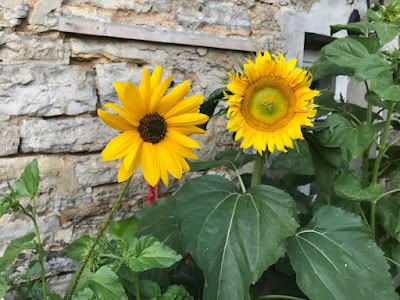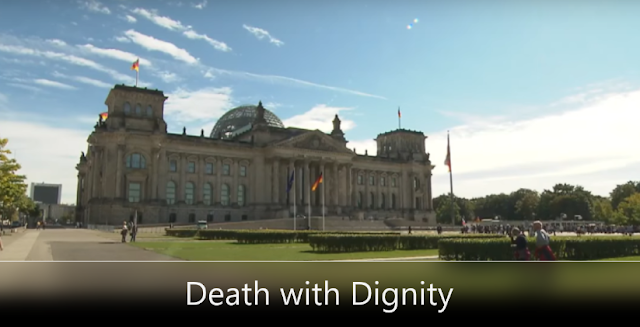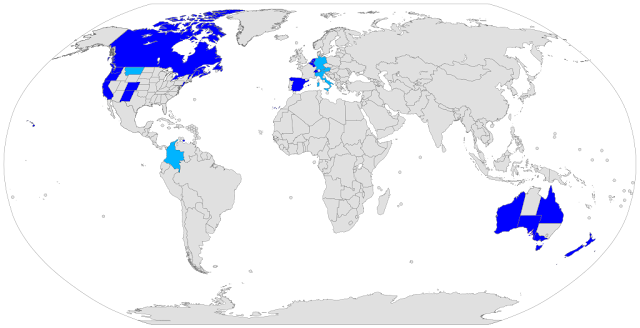Death doesn't end love - returning to life after losing your partner
The death ended my wife’s life, but not my love for her. I still love my wife - even there is no reply anymore.
Process of mourning
When I think about my process of mourning and my learning of mourning - I think it is important to realize the absence of the deceased. But at the same time, however, there is also the strong wish to be able to continue living this love - for sure in a different form. If I / you can manage to find a way to do it - to continue this love, I firmly believe - it can be a great resource for future life without the deceased.
The pain as a constant companion of grief is there, but hope also accompanies it!
I have the feeling, the worry … that it will be not easy and also hardly noticeable at first and in the near future, but I believe that it will grow more and more.
And I already feel it has become easier while I talk about my wife and the steps my wife and I took, and how my wife got to her decision. Talking to friends, grief counselors, in self-help groups and online helps a lot.
Everyone reacts differently to emotional suffering.
Some only see the loss: “My partner has died, without her/him my life is pointless”.
And others may and I am saying: “My partner has died and I am still alive. How can it go on?”
I learned that this response to death is called a resilient response. This does not mean that I am and these other people do not experience difficult moments in their grief - only the attitude towards them is different. Nobody can predict the way of resilience, you can only draw conclusions after a stressful situation. Therefore, it is possible that people - as I did who have had many crises in their life - can more easily take a resilient position.
Friends can and will help - and we as bereaved people have to do something for ourselves.
I think self-awareness and mindfulness is a good keyword here. Giving the mourner the feeling that he / she is not alone - and I am so much thankful to have so many great friends, great colleagues, and grief counselors always there for me.
Mourners themselves can make an agreement with themselves as to when they should give in or pursue their grief during the day. If someone has to work or take care of small children, it is important to keep functioning. The grief is then very present in certain phases and less in other phases.
I experienced that external resources has helped and still help a lot: family and especially my mother-in-law, friendships and my job (which I really love). Anyone who has already experienced grief knows what to expect - look for such contacts - e.g self-help groups online or in person. The feeling is no longer so strange and does not whirl everything upside down - I often had the impression that the days and my feelings were like a roller-coaster after my wife died.
Death doesn't end love
I have the feeling, the worry … that it will be not easy and also hardly noticeable at first and in the near future, but I believe that it will grow more and more.
And I already feel it has become easier while I talk about my wife and the steps my wife and I took, and how my wife got to her decision. Talking to friends, grief counselors, in self-help groups and online helps a lot.
Everyone reacts differently to emotional suffering.
Some only see the loss: “My partner has died, without her/him my life is pointless”.
And others may and I am saying: “My partner has died and I am still alive. How can it go on?”
I learned that this response to death is called a resilient response. This does not mean that I am and these other people do not experience difficult moments in their grief - only the attitude towards them is different. Nobody can predict the way of resilience, you can only draw conclusions after a stressful situation. Therefore, it is possible that people - as I did who have had many crises in their life - can more easily take a resilient position.
Friends can and will help - and we as bereaved people have to do something for ourselves.
I think self-awareness and mindfulness is a good keyword here. Giving the mourner the feeling that he / she is not alone - and I am so much thankful to have so many great friends, great colleagues, and grief counselors always there for me.
Mourners themselves can make an agreement with themselves as to when they should give in or pursue their grief during the day. If someone has to work or take care of small children, it is important to keep functioning. The grief is then very present in certain phases and less in other phases.
I experienced that external resources has helped and still help a lot: family and especially my mother-in-law, friendships and my job (which I really love). Anyone who has already experienced grief knows what to expect - look for such contacts - e.g self-help groups online or in person. The feeling is no longer so strange and does not whirl everything upside down - I often had the impression that the days and my feelings were like a roller-coaster after my wife died.
Death doesn't end love
Returning to life after losing your partner, you need strength not to see yourself as a victim of fate. And you need hope to be able to experience love again.
Good thoughts, a positive attitude, and optimism is the ‘gasoline’ that leads to achievement. Nothing can be done without hope and confidence.
Good thoughts, a positive attitude, and optimism is the ‘gasoline’ that leads to achievement. Nothing can be done without hope and confidence.
sunflowers were the favorite flower of my wife






If you like - Please send me your comment, or suggestion you may have. I will not publish the comments. If you want a reply please don't forget to leave your contact information.
ReplyDelete